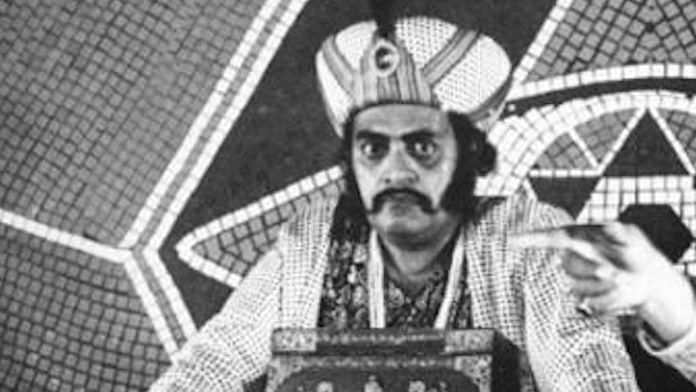Mention Utpal Dutt and most people will think of Bhavani Shankar, the gruff, quirky man from Hrishikesh Mukherjee’s 1979 smash hit, Gol Maal. But Utpal Dutt was so, so much more.
Born on 29 March 1929 in Barisal, now in Bangladesh, Dutt was a towering figure on stage and screen. He was a founding member of the IPTA (Indian People’s Theatre Association), a director and a writer-playwright, and a lifelong Marxist who often used theatre as a vehicle to send a political message.
In fact, his transition to films began after he performed in Othello during his time with the Shakespearana International Theatre Company (run by Geoffrey and Laura Kendal, parents of Jennifer Kendal) and it is then that filmmaker Madhu Bose offered him the lead role in his film Michael Madhusudan (1950). In his 40-year career as a film actor, he did more than 100 movies in Hindi and Bengali.
While most will remember his comic roles in mainstream hits such as Hrishikesh Mukherjee’s Gol Maal, he was a versatile actor who played roles ranging from intense to villainous. It’s no surprise that where he won Filmfare Awards three times for his comic roles in Hindi movies (Gol Maal, Naram Garam and Rang Birangi), he also won a National Award for his masterful portrayal of an uptight, lonely man in Mrinal Sen’s Bhuvan Shome, which heralded the New Wave in Indian cinema.
On his 91st birth anniversary, here’s a look at just five vastly different movies from his incredibly diverse repertoire.
Also Read: The isolation of Bhuvan Shome is all too real in a time of social distancing
Bhuvan Shome
Mrinal Sen’s 96-minute long movie tells the story of a proud, upright and lonely man who has driven away everyone in his life. The railway officer is a strict and staunch disciplinarian, until he meets Gauri (played by Suhasini Mulay) during a hunting holiday in Gujarat.
As a character, Bhuvan Shome would be easy to dislike were it not for Dutt’s excellent delivery, portraying different shades of his character when he meets Gauri. The village girl comes as a breath of fresh air in Bhuvan’s life and teaches him to relax a little. Dutt’s subtle expressions even in anger and his natural character transformation make the film a masterpiece.
Gol Maal
One of Utpal Dutt’s most loved roles is that of Bhavani Shankar in Hrishikesh Mukherjee’s Gol Maal. Bhavani Shankar is a strict boss who doesn’t want his employees to pursue any hobbies. From Shankar’s fits of rage to his strange fixations, the role is a delight and Dutt revels in its over-the-top nature.
It is impossible to not laugh at Dutt’s expressions as Bhavani Shankar, who gets irritated with the slightest of things and everybody around him gets a dose of his bristling anger. His chemistry with Amol Palekar, who plays a double role in the film is great fun, but one of the best scenes is when Dutt says that a “moustache is the mirror of a man’s soul” for the audience by twisting his moustache, holding his head high with pride in his eyes.
Agantuk
In Satyajit Ray’s last movie, the Bengali drama Agantuk (1991), Dutt plays the role of Manmohan Mitra, a gentleman who claims to have roamed across the world for 35 years. There is an air of mystery around his identity throughout the film, which starts the moment he comes into Anila’s (Mamata Shankar) life and family in Kolkata as her long-lost uncle.
Manmohan’s entry into the lives of Anila and Sudhindra (Anila’s husband) and their family impacts their personal relationships and reveals a lot about human emotions. The equation between Manmohan Mitra and Sudhindra is bitter as the latter is skeptical of the motives of the stranger in his house.
As he and his barrister friend grill Manmohan over his travel history, Dutt’s expressions of pity towards them for doubting him are brilliant. Not only does Utpal Dutt portray Manmohan Mitra as an intellectual with great sense of humour, but he also adds a tinge of helplessness in his eyes.
Saaheb
In Anil Ganguly’s 1985 Hindi-language family drama, Dutt plays the role of a retired widower, Badri Prasad Sharma, who has four sons a one daughter. Dutt who is otherwise known for his finesse as a comic actor, shines throughout the movie with his natural portrayal of a typical middle-class father who worries about his children.
Badri Prasad is a gruff father, who is constantly disappointed with his wayward son, Saaheb, played by Anil Kapoor. The father-son dynamic is engaging and Dutt leads the way with his balanced character play. Even if Badri Prasad comes across as a strict father who doesn’t understand Saaheb’s interest in football and is constantly dismayed with his choices in life, he still is an emotional father who wants the best for his family. In fact, Dutt not only lends the character all the necessary attributes to come across as the family’s patriarch, but also balances it with a shade of touching vulnerability in his discussions with his children about finances.
Shakespeare Wallah
The Merchant Ivory-produced 1961 English drama tells the story of an English family and troupe of actors, the Buckinghams, who lead a nomadic life performing Shakespearean plays across India. Dutt here plays the role of Maharaja, who has a colonial hangover (complete with a fantastic British accent) and loves to talk about his London visits.
Dutt’s versatility is seen in his portrayal of a well-read Maharaja who is fascinated with Shakespearean literature. His expressions are priceless as he narrates “The Quality of Mercy is Not Strain’d”, a phrase from Shakespeare’s The Merchant of Venice, and “We go to Shakespeare not only for his mercy but also for his wisdom.”
Also Read: In Uttam Kumar & Sharmila Tagore’s film ‘Amanush’, floods restore faith in human spirit



